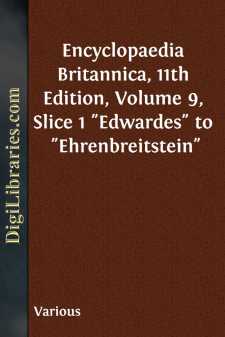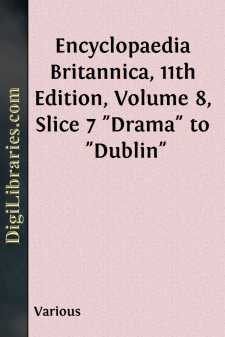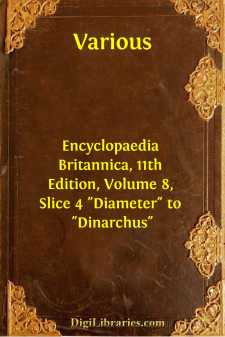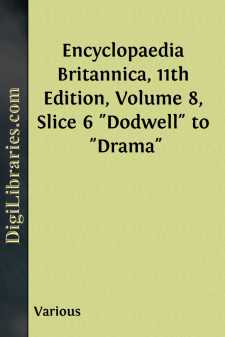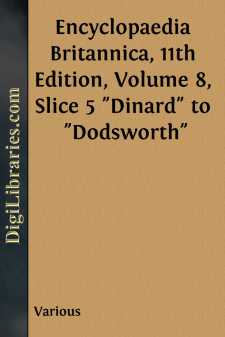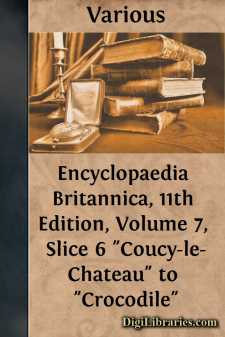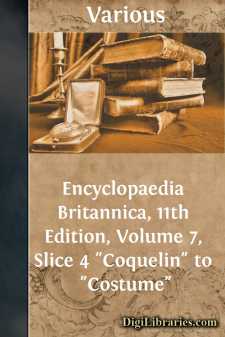Reference
- Atlases 1
- Bibliographies & Indexes 10
- Catalogs 55
- Dictionaries 1
- Encyclopedias 43
- Etiquette 14
- Handbooks & Manuals 19
- Heraldry 2
- Quotations 9
Reference Books
Sort by:
by:
Various
EDWARDES, SIR HERBERT BENJAMIN (1819-1868), English soldier-statesman in India, was born at Frodesley in Shropshire on the 12th of November 1819. His father was Benjamin Edwardes, rector of Frodesley, and his grandfather Sir John Edwardes, baronet, eighth holder of a title conferred on one of his ancestors by Charles I. in 1644. He was educated at a private school and at King’s College, London....
more...
by:
Various
Medieval Drama While the scattered and persecuted strollers thus kept alive something of the popularity, if not of the loftier traditions, of their art, neither, on the other hand, was there an utter absence of written compositions to bridge the Ecclesiastical and monastic literary drama. gap between ancient and modern dramatic literature. In the midst of the condemnation with which the Christian...
more...
by:
Various
DIAMETER (from the Gr. διì, through, μÃτρον, measure), in geometry, a line passing through the centre of a circle or conic section and terminated by the curve; the “principal diameters” of the ellipse and hyperbola coincide with the “axes” and are at right angles; “conjugate diameters” are such that each bisects chords parallel to the other. The diameter of a quadric...
more...
by:
Various
DEMIJOHN, a glass bottle or jar with a large round body and narrow neck, encased in wicker-work and provided with handles. The word is also used of an erthenware jar, similarly covered with wicker. The capacity of a demijohn varies from two to twelve gallons, but the common size contains five gallons. According to the New English Dictionary the word is an adaptation of a French Dame Jeanne, or Dame...
more...
by:
Various
DODWELL, EDWARD (1767-1832), English traveller and writer on archaeology. He belonged to the same family as Henry Dodwell the theologian, and was educated at Trinity College, Cambridge. He travelled from 1801 to 1806 in Greece, and spent the rest of his life for the most part in Italy, at Naples and Rome. He died at Rome on the 13th of May 1832, from the effects of an illness contracted in 1830 during...
more...
by:
Various
DINARD, a seaside town of north-western France, in the department of Ille-et-Vilaine. The town, which is the chief watering-place of Brittany, is situated on a rocky promontory at the mouth of the Rance opposite St Malo, which is about 1 m. distant. It is a favourite resort of English and Americans as well as of the French, its attractions being the beauty of its situation, the mildness of the climate...
more...
by:
Various
COUCY-LE-CHÂTEAU, a village of northern France, in the department of Aisne, 18 m. W.S.W. of Laon on a branch of the Northern railway. Pop. (1906) 663. It has extensive remains of fortifications of the 13th century, the most remarkable feature of which is the Porte de Laon, a gateway flanked by massive towers and surmounted by a fine apartment. Coucy also has a church of the 15th century, preserving a...
more...
by:
Various
COQUELIN, BENOÎT CONSTANT (1841-1909), French actor, known as Coquelin aîné, was born at Boulogne on the 23rd of January 1841. He was originally intended to follow his father’s trade of baker (he was once called un boulanger manqué by a hostile critic), but his love of acting led him to the Conservatoire, where he entered Regnier’s class in 1859. He won the first prize for comedy within a year,...
more...
by:
Various
CONSTANTINE PAVLOVICH (1779-1831), grand-duke and cesarevich of Russia, was born at Tsarskoye Selo on the 27th of April 1779. Of the sons born to the unfortunate tsar Paul Petrovich and his wife Maria Feodorovna, née princess of Württemberg, none more closely resembled his father in bodily and mental characteristics than did the second, Constantine Pavlovich. The direction of the boy’s upbringing...
more...
by:
Various
(Lat. _conventio_, an assembly or agreement, from _convenire_, to come together), a meeting or assembly; an agreement between parties; a general agreement on which is based some custom, institution, rule of behaviour or taste, or canon of art; hence extended to the abuse of such an agreement, whereby the rules based upon it become lifeless and artificial. The word is of some interest historically and...
more...


